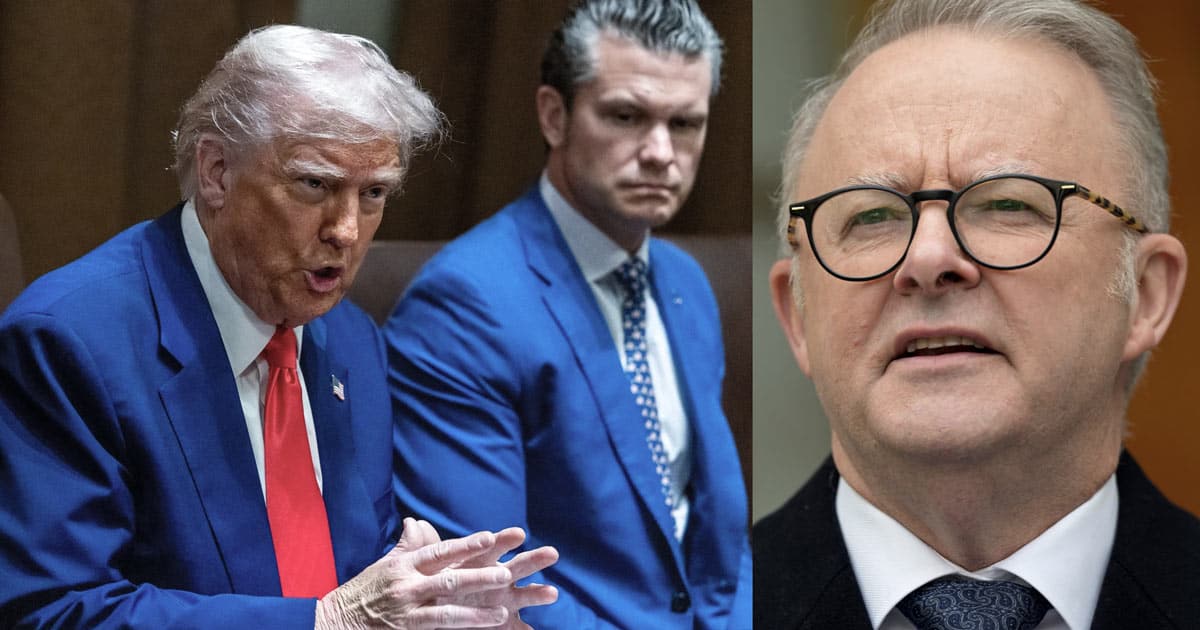Australia’s Prime Minister Anthony Albanese is resisting requests from President Donald Trump’s administration for the nation to increase its defense spending budget.
Albanese, the head of the left-wing Australian Labor Party, is drawing a firm line when it comes to national defense and the country’s military spending priorities.
This comes in response to calls from U.S. Defense Secretary Pete Hegseth, who urged Australia to immediately increase defense spending to 3.5% of its GDP during the recent Shangri-La Dialogue in Singapore.
Hegseth’s plea reflects growing concern in Washington over Chinese military expansion and instability in the Indo-Pacific.
However, Albanese made it clear that Canberra will not be dictated to by Washington.
Speaking to reporters on June 2, he emphasized a strategy based on capability and need, not arbitrary spending targets.
“What you should do in defence is decide what you need, your capability, and then provide for it,” Albanese said.
“That’s what my government’s doing—investing in our capability and investing in our relationships.”
The Albanese government has committed an additional $10 billion to defense in its forward estimates and set a target to raise defense spending to 2.3% of GDP.
That number falls well short of the 3–3.5% figure floated by both Hegseth and U.S. Undersecretary of Defense Elbridge Colby.
Hegseth and Colby warned that Australia’s current spending levels lag behind NATO benchmarks and fall short of what’s required to face China’s growing threat.
In fact, Colby, speaking to the U.S. Senate Armed Services Committee earlier this year, framed Australia’s defense posture as dangerously underfunded.
“Australia is a core U.S. ally… [but] the main concern the United States should press with Australia… is higher defense spending,” he said, pointing out that Canberra’s threat environment is arguably more acute than Europe’s.
Nevertheless, Albanese has resisted these overtures, reinforcing that Australia must chart its own path.
In comments on June 1, he stated bluntly: “We’ll determine our defence policy.”
In its 2025-26 federal budget, the Albanese administration reaffirmed that defense funding would surpass 2.3% of GDP by the early 2030s.
For Washington, that timeline and level of commitment may be too slow.
But Deputy Prime Minister Richard Marles stood by the government’s approach, noting that Australia is already making a “generational investment” in defense.
He acknowledged, however, that regional security requires a collective effort.
“The reality is that there is no effective balance of power in this region absent the United States,” Marles said.
“But we cannot leave this to the U.S. alone.
“Other countries must contribute to this balance as well, including Australia.”
Marles, who met with Hegseth during the dialogue, emphasized cooperation between the two allies, including advancing the AUKUS partnership, strengthening supply chains, and accelerating the U.S. military’s force posture initiatives in Australia.
A Pentagon readout highlighted that the two sides discussed aligning defense investment with regional threats and reinforcing industrial collaboration.
During his remarks in Singapore, Marles did not shy away from highlighting the growing threat posed by China.
He warned of “the largest conventional military build-up” since World War II and criticized Beijing’s lack of transparency, calling it a defining feature of the region’s strategic complexity.
“It is doing so without providing any strategic transparency or reassurance,” Marles said.
He also emphasized the importance of AUKUS, calling the agreement to acquire nuclear-powered submarines “essential to our national security” and a key part of ensuring geostrategic balance in the Indo-Pacific.
The high-level defense dialogue in Singapore was attended by a host of world leaders and defense officials, including French President Emmanuel Macron, Malaysian Prime Minister Anwar Ibrahim, and Singapore’s Defense Minister Chan Chun Sing.
Despite the calls for higher spending from U.S. officials, the Albanese government appears to be ignoring warnings about its defense policy and spending priorities.
However, with the growing threat from China, this could be a mistake that Albanese can ill afford to make.
READ MORE – Australia Abruptly Shuts Down Covid ‘Vaccine’ Safety Study, Destroys All Data

Our comment section is restricted to members of the Slay News community only.
To join, create a free account HERE.
If you are already a member, log in HERE.